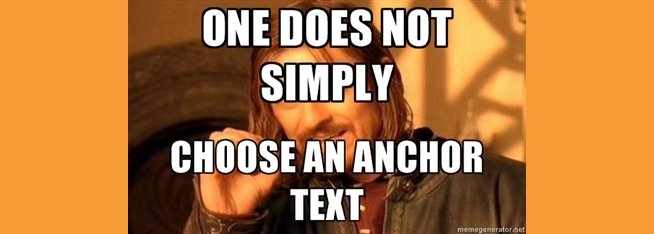
Anchor text future according to 19 experts
In this post Penguin Update world, links, and especially the anchor text, have become a topic hotter than ever. In the last two months, more than once I have been asked questions like: “I’ve 30% of exact anchor text, am I at risk”? Or: “How many links should have a generic anchor text?”.
In each case the answer may be different, and I honestly don’t know it for sure.
Anyway, when we talk about links I think anchor text is still a large part of this. IMHO it remains a fundamental off-page metric and (in my experience) I find it very difficult to get good rankings without having any keywords in the anchor text. You can have strong on-page optmization and lots of tweets/share/+1s but keyword anchor text appears to still be necessary to rank for competitive terms (and Matt Cutts confirms social signals aren’t as strong as links at the moment). However, the link building scene is changing. Google admitted negative SEO isn’t impossible; the Penguin Update penalized a lot of sites with unnatural link profiles. A few weeks ago Tadeusz Szewczyk wrote an interesting post for SEOGadget about anchor text optimization. I consider his suggestions quite excellent but I still wonder, Where is the truth? Could we hope linking ‘naturally‘ will be enough? Or do you still need to be aggressive to rank? And where are the keyword anchor text limits, what is too much?
I decided the best way to try answering these questions could be by collecting the opinions of organic search experts to determine whether or not there is concordance of ideas on two points: how much weight will have the anchor text in the near future and which could be the distribution of a “reasonable” link profile.
Are you curious about the results? Let’s start.
Participants
I’ve invited to my survey a wide range of professionals with different profiles, including technical SEOs, white hats as well as black hats, and pure link builders, content-led or not. Those who have accepted to participate are the following, listed in no particular order (at the end of the list you’ll find me too; I’ve added my thoughts only to closed-ended questions so to have 20 answers – nicer than 19).
Along with them, I also want to thank Bill Slawski, who has added some interesting considerations via email (you’ll find them later in the post), and Shelli Walsh, who has fixed my grammar mistakes in the survey form.
International SEO & Web Marketer founder of IloveSEO.net and SEOmoz associate member.
Owner of the link building company Link Fish Media Inc. and co-founder of SEO-Chicks.com.
Founder of Skyrocket SEO, a content-led link building and content marketing agency based in UK.
Director of SEO at True Action Network and niche site builder; he blogs about SEO on Halo18.
Online Marketing Manager at Koozai Ltd, a UK Digital Marketing Agency. Author of Free Stuff Everyday.
Co-founder of Linkbuilding.nl, a Dutch link building agency, speaker at several leading industry events.
Senior SEO Analyst at RankAbove and Ph.D. biology student; SEO Scientist is his personal blog.
CEO at Xight Interactive. Author of Kaiserthesage, leading Philippines SEO blog.
Internet marketing specialist founder of inbound marketing and SEO blog Cucumber Nebula.
Search Engine Strategist focused on Small Business SEO and SEM; personal website Explicitly.me.
Part time SEO consultant and link building blogger on his own website, PointBlankSEO.com.
SEO consultant at Distilled, London office, also Consultant and blogger on PaddyMoogan.com.
Senior SEO for Internet Marketing Company SEER Interactive and Web analytics Expert.
Founder of SEO firm Pole Position Marketing and speaker at several industry conferences.
Founder of LogoBotixX, a company providing automatic content creation and advanced cloaking services.
Online marketer with experience from small businesses to Fortune 500 firms; his personal blog is HugoGuzman.com.
Internet marketer and guest author at the most prominent Internet marketing blogs; owner of MyBlogGuest.com.
Head of the SEO Team at ZeoBIT LLC and SEO Consultant (both whitehat and blackhat) at IrishWonder.com.
Organic search specialist at content marketing agency Quaturo; also writes about SEO on his personal blog.
Unknown Italian SEO specialist, owner of the SEO blog you’re now reading: Giuseppe Pastore.
Anchor text in 2013+
Participants were asked closed-ended questions with vote options from 1 (impossible) to 5 (sure). Their answers are aggregated into histograms so you can check their distribution.
Since we can consider answers as random variables with an integer value between 1 and 5, for each question it makes sense to evaluate their mean value.
For each question it will be also specified who has given the minimum and maximum vote.
Anchor text as a ranking factor
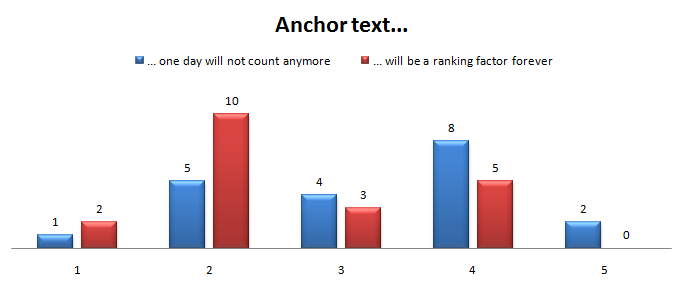
Two questions to start, about anchor text in general.
1) One day anchor text won’t be a ranking factor anymore
The red columns show how the participants tend to consider unlikely that anchor text will not play a role in rankings in the future. The mean value for this question has been 2.55.
The minimum value (1 – impossible) has been given by Jon Cooper and Stoney deGeyter; no one has choosen the maximum (5 – sure).
2) Anchor text will be a ranking factor forever
According to the previous votes, the blue columns show participants slightly tend to believe anchor text will be a ranking factor.
The mean value for these questions have been 3.25 (likely).
Minimum vote (1), has come from Peter Attia.
Maximum (5) from Jon Cooper and Stoney deGeyter.
Anchor text weight in general
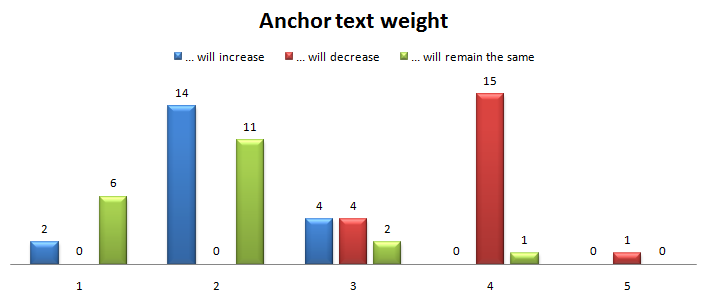
This set of questions is related to anchor text weight.
1) Anchor text weight will increase
Participants don’t believe anchor text weight will increase in the future, expressing votes with a mean value of 2.1.
Minimum vote (1), has come from Peter Attia and Annie Cushing.
2) Anchor text weight will decrease
On the contrary, they consider very likely (mean value 3.85) that anchor text will decrease.
Maximum vote (5) has been assigned by Annie Cushing.
3) Anchor text weight will remain the same as now
According with the clear direction expressed in the previous two questions, they judge very unlikely (1.9 as mean value) that anchor text weight will remain the same as now.
Maximum (4) from Ann Smarty.
Conclusion
In conclusion this set shows a quite big confidence in a decreasing of anchor text weight in the future.
Exact anchor text weight
1) Exact Anchor text weight will increase
Exact anchor text weight will not increase: participants mean vote has been 1.85.
2) Exact Anchor text weight will decrease
Participants strongly agree that Exact anchor text weight will decrease in the future: 4.15 is the mean value.
Minimum vote (2) has been assigned by Jason Acidre.
3) Exact Anchor text weight will remain the same as now
Also in this case, as the previous answers indicate, they tend to believe not very likely (mean value of 1.85) that this metric might have the same power as now in the future.
Conclusion
From this set of answers we could conclude that the participants are quite sure exact anchor text will become less powerful in the next years.
Broader anchor text weight
1) Broader Anchor text weight will increase
The mean value in this case has been 3.05.
Minimum value (1) by James Agate.
2) Broader Anchor text weight will decrease
As the previous question, also this one has received not so firm answers: mean value is 2.8.
Minimum vote (1) has been assigned by Ian Howells and Jason Acidre
Maximum vote (5) by James Agate.
3) Broader Anchor text weight will remain the same as now
The mean value in this case is 2.35.
Maximum value (4) by Peter Attia.
Conclusion
As you can see from the histograms, there’s not a clear opinion: using a broader match in linking could be either less or more effective, or remain as effective as now.
Branded anchor text weight
1) Branded Anchor text weight will increase
Participants tend to believe branded anchor text weight could increase: mean value is 3.6.
Minimum value (1) by James Agate.
2) Branded Anchor text weight will decrease
In terms of mean value (2.25) we could say they tend to think that is quite unlikely that branded anchor text will be less powerful in the future, anyway there isn’t a wide concordance for this question.
Maximum vote (5) by James Agate.
3) Branded Anchor text weight will remain the same as now
Results for this question are very similar to the previous ones: 2.25.
Maximum value (4) by Julie Joyce, Peter Attia and Sean Revell.
Conclusion
From this set of questions we can observe participants believing branded anchor text could have an higher weight in the future, anyway there’s little concordance on this opinion.
Internal links anchor text weight
1) Internal Anchor text weight will increase
In this case mean value is 2.45, indicating a shared opinion of internal anchor text being less powerful in the future.
Minimum value (1) by Jon Cooper.
Maximum (4) by IrishWonder.
2) Internal Anchor text weight will decrease
Participants have voted with a mean value of 3.25.
Minimum value (1) by Jason Acidre.
Maximum (4) by Jon Cooper.
3) Internal Anchor text weight will remain the same as now
Iin this case mean value is 2.5.
Minimum value (1) by Julie Joyce, Stoney deGeyter and Rishi Lakhani.
Maximum (4) by Sean Revell.
Conclusion
From this set of questions we could conclude that there’s a little preference in believing internal anchor text in the future will have less weight than it has now.
Weight of Contextual text surrounding anchor text
1) Weight of Contextual text surrounding anchor text will increase
Participants believe in the future the text surrounding the link will be more important than now: mean value is 3.95.
Minimum value (2) by Stoney deGeyter and Branko Rihtman.
2) Weight of Contextual text surrounding anchor text will decrease
To this question, the answer is “not likely” (mean value is 2.05).
Minimum value (1) by Jason Acidre, Ralph Tegtmeier and IrishWonder.
Maximum (4) by Stoney deGeyter.
3) Weight of Contextual text surrounding anchor text will remain the same as now
Mean value is again 2.05.
Maximum value (4) by Branko Rihtman.
Conclusion
Looking at this set of questions, participants think search engines will give more credit to the text surrounding the link.
Sidebar anchor text weight
1) Sidebar anchor text weight will increase
Not so much to add to the graph: mean value is 1.65.
2) Sidebar anchor text weight will decrease
Very strong concordance here too: mean value is 4.3.
3) Sidebar anchor text weight will remain the same as now
Mean value is 1.9.
Conclusion
Quite easy conclusions in this set of answers: sidebar anchor text will count less and less in the future.
Footer anchor text weight
1) Footer anchor text weight will increase
As expected, no one believes footer anchor text will carry more weight: mean value is 1.4.
2) Footer anchor text weight will decrease
Almost everyone believes footer link will count less: mean value is 4.55.
3) Footer anchor text weight will remain the same as now
Mean value here is 1.95.
Conclusion
As seen for sidebar links, also for footer ones anchor text will be less effective than now in the future.
Out of topic links anchor text weight
1) Out of topic links anchor text weight will increase
In this case mean value is 1.75: it’s unlikely that anchor text of out of topic links will carry more weight.
Maximum value (4) by Julie Joyce and Paddy Moogan.
2) Out of topic links anchor text weight will decrease
In this case the answer is less firm: mean value is 3.75 and answers vary more, with 5 participants not believing that anchor text of out of topic links will be devalued.
3) Out of topic links anchor text weight will remain the same as now
Mean value here is 2.
Conclusion
In this set of questions we see that even if almost everyone thinks anchor text of out of topic links will not increase its weight, not everyone believes this kind of links will be devalued.
In-topic links anchor text weight
1) In-topic links anchor text weight will increase
Mean value is 3.55, but there’s very little concordance, with someone voting 2 and others voting 5.
Maximum value (5) by Jon Cooper and James Agate.
2) In-topic links anchor text weight will decrease
2.4 is the mean value but also in this case answers vary a lot, from 1 to 4.
3) Out of topic links anchor text weight will remain the same as now
Mean value here is 2.6.
Minimum value (1) by James Agate, Rishi Lakhani and Stoney deGeyter.
Maximum value (4) by Sean Revell and Jason Acidre.
Conclusion
Will anchor text of in-topic links be more powerful in the future? Or will it be less? Little preference for an increasing value, but little concordance too.
Correlations
If you’re wondering how much answers of a participant tend to be similar to those of the others, here is a graph of the Pearson’s coefficients mean values (the higher the value, the greater the similarity).
Branko Rihtman and Ralph Tegtmeier‘s answers have been the most different from the others.
Anchor text distribution
Participants were also asked to describe a link profile in term of percentages of anchor text with Exact Match Keywords, Broader Match Keywords, Branded Keywords, Pure Brand, plain URL, generic text.
Before you read the results, I want to clarify it’s important you don’t consider them as a recommendation or sort of a best practice.
The best possible explanation to this statement is what search patent expert Bill Slawski wrote me via email, you can read it here (bolds are mine):
I don’t think that there’s some percentage of hypertext relevance that triggers some penalty that can be easily spotted or identified. There’s the possibility of additional variables that we don’t know about, thresholds that we may never see or learn, treatments of sites in different categories that may follow different algorithms based upon those categories, and more.
What we know about things that we don’t know about can often be much larger or more complicated than we might like to believe. For instance, Google might treat links found in the main content areas of pages differently than links in sidebars or footers differently both in how much pagerank and anchor text relevance they pass along, and in the analysis of those links from other sites as part of a link profile. A link from a page that’s pointed to by a dense subgraph of pages, like those that might point to a doorway page, may also play a different role in a link profile analysis. A link from a page that might be considered to be an affiliated page, in that it shows signals of common ownership with pages it might link to may also be interpreted differently in terms of hypertext relevance.
One of Google’s patent filings about how they might treat exact match domains described 8 different and alternative ways of analyzing the phrases used in a domain name to see how much “commercial intent” there was in those keywords, and might impose a threshold value on how much benefit the use of those domain names might have on the rankings of those pages. We don’t know if Google one of those alternatives, or something else entirely, but if they are following a particular one, it’s probably after much testing, and even some significant tweaking.
It’s possible that some level of commercial intent analysis might play a role in how Google treats anchor text as well.
It’s also possible that Google uses the anchor text analysis described in the many phrase-based indexing patents, which might give different values to the strength of anchor text pointed to pages based upon how frequently the words used in that anchor text tend to co-occur on pages that might rank for a specific query.
I don’t believe that just looking at a percentage of how many links pointed to a page use specific anchor text is helpful. Chances are that the value of hypertext relevance from a link on a page pointed to another page may be weighted differently from one link to another links as well, much like PageRank varies from one link to another.
I can’t really add anything to such a detailed analysis, so just keep in mind that what you’re going to read is just a comparison of answers, not a description of a perfect pie.
Exact anchor text
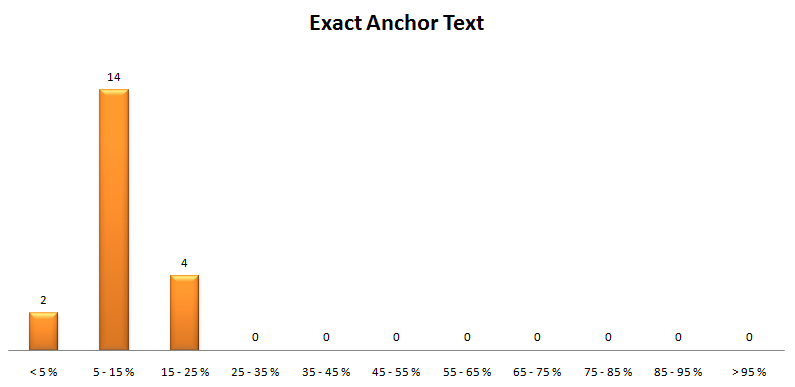
Most of the participants indicates a preference for having little exact anchor text.
Minimum vote (< 5 %) by Hugo Guzman and Ann Smarty.
Broader anchor text
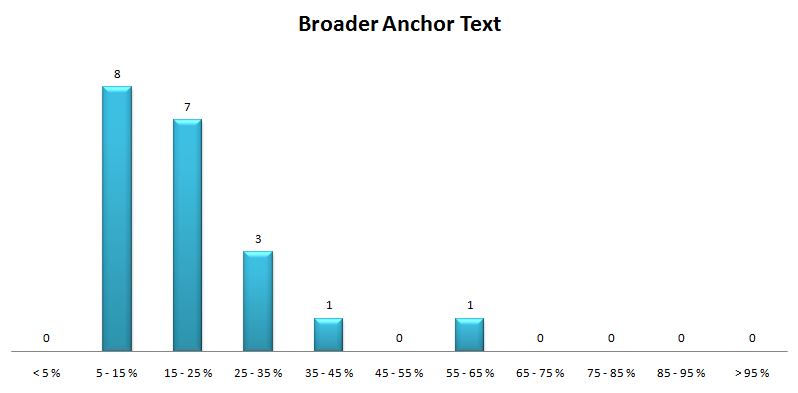
Opinions here vary more, anyway the tendency is for not having much broader anchor text.
Maximum vote (55 – 65 %) by Peter Attia.
Branded anchor text
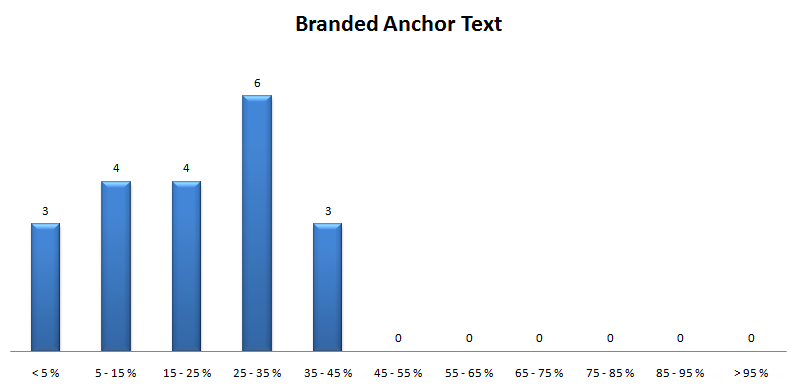
Branded anchor text seems to be important, but not for everyone.
Minimum vote (< 5 %) by Hugo Guzman, Rishi Lakhani and Stoney deGeyter.
Maximum vote (35 – 45 %) by Gianluca Fiorelli, Paddy Moogan and Annie Cushing.
Pure brand anchor text
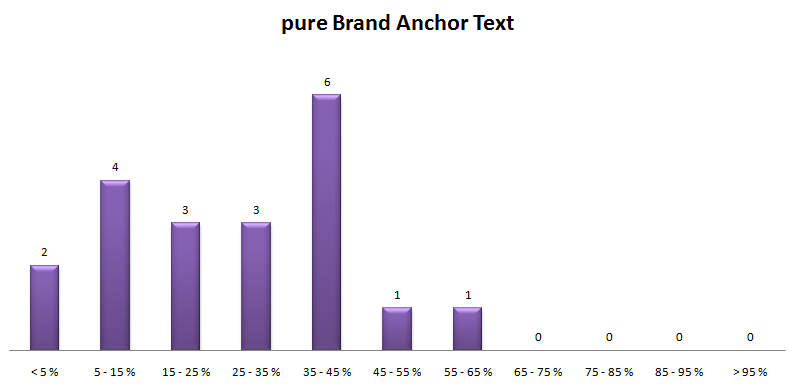
Pure brand anchor text has a medium/high preference, even if not for everyone.
Minimum vote (< 5 %) by Ralph Tegtmeier, Rishi Lakhani and Stoney deGeyter.
Maximum vote (55 – 65 %) by Hugo Guzman.
URL anchor text
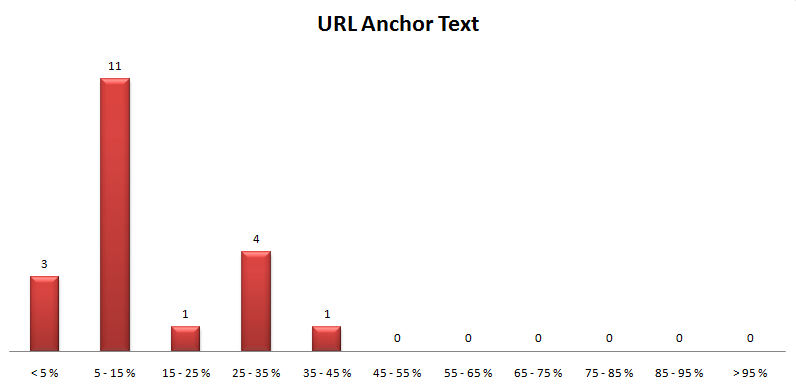
Generally, URL anchor text has been indicated as a minor part of a link profile.
Minimum vote (< 5 %) by Peter Attia, Annie Cushing and Mike Essex.
Maximum vote (35 – 45 %) by Branko Rihtman.
Generic anchor text
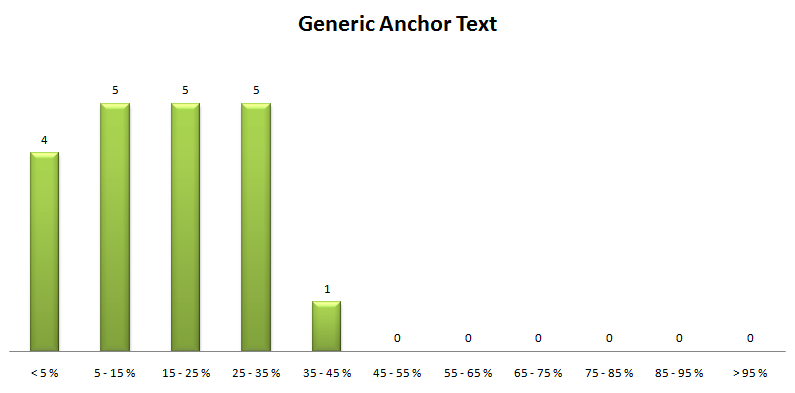
Is generic anchor text important? Someone thinks you better have a good amount of it, someone doesn’t.
Maximum vote (35 – 45 %) by Wiep Knol.
Anchor text: how to deal with it?
After all these statistics, it’s time to put it into words. How much does the ranking game rely on anchor text today and is this likely to change in the near future? This is what the participants have said (bolds are mine)…
Gianluca Fiorelli
![]() Anchor Text still have a value for rankings right now. It’s the abuse of its use that is getting punished. We can notice that quite easily by examining the web analytics of a penguinized site. In fact, pages whose backlinks were having comerccial exact matching anchor text have lost almost all their traffic for those same keywords, but still rank quite well for other that weren’t used so massively as anchor text (or they lost just few positions in the rankings).
Anchor Text still have a value for rankings right now. It’s the abuse of its use that is getting punished. We can notice that quite easily by examining the web analytics of a penguinized site. In fact, pages whose backlinks were having comerccial exact matching anchor text have lost almost all their traffic for those same keywords, but still rank quite well for other that weren’t used so massively as anchor text (or they lost just few positions in the rankings).
Therefore, IMHO, is not a question of anchor text but more a matter of how natural is our link profile. If our site’s backlink have just or in their majority inbound links with exact matching anchor texts, well… it is quite clear those links are not naturally given, but created with the clear intent of conditioning the rankings.”
Julie Joyce
![]() I think that it’s honestly an impossible thing to predict… I’d love to think that anchors will be more semantically evaluated along with the surrounding content but I am not sure the algorithm is that advanced yet.
I think that it’s honestly an impossible thing to predict… I’d love to think that anchors will be more semantically evaluated along with the surrounding content but I am not sure the algorithm is that advanced yet.
James Agate
 Anchor text is still a large/heavily weighted ranking factor. I think it will continue to be the case for a while to come but this is obviously something to monitor quite carefully. I mean I think too many people will go crazy too quickly and start building links that avoid any kind of keyword mentions but we are seeing plenty of situations where sites are still outranking others that have fewer keyword rich links.
Anchor text is still a large/heavily weighted ranking factor. I think it will continue to be the case for a while to come but this is obviously something to monitor quite carefully. I mean I think too many people will go crazy too quickly and start building links that avoid any kind of keyword mentions but we are seeing plenty of situations where sites are still outranking others that have fewer keyword rich links.
It all comes down to quality of links really. If you can secure a solid, trusted link with some great keyword rich anchor text then go for it, if the site doesn’t want you to include a keyword link or if it doesn’t feel right to you then opt for natural anchor text because that is still going to carry weight.
Try to avoid where possible developing multiple links with precisely the same anchor texts (there are exceptions of course) but anything that is going to distort your ratios could come back to bite you.
There may come a time when anchor text doesn’t matter but I still feel that despite the obvious flaws and manipulation, anchor text can be a great indicator to Google of the topic of a page and how relevant it is to a particular search query.
Ian Howells
![]() I think Google is looking for the balance of the natural web in terms of how often people are linking using keyword rich anchors vs generic/branded anchors. They’ll likely be using a seed list of trusted sites with what they’ve deemed “natural” profiles to build models for comparison. For that reason, I try to take my cues by looking at sites that I consider to be trusted authorities in their space, and examining their link ratios and then being a bit more conservative than they are (given I likely don’t have the authority that they do, they would be able to “get away” with being more aggressive).
I think Google is looking for the balance of the natural web in terms of how often people are linking using keyword rich anchors vs generic/branded anchors. They’ll likely be using a seed list of trusted sites with what they’ve deemed “natural” profiles to build models for comparison. For that reason, I try to take my cues by looking at sites that I consider to be trusted authorities in their space, and examining their link ratios and then being a bit more conservative than they are (given I likely don’t have the authority that they do, they would be able to “get away” with being more aggressive).
Google’s trying to incorporate more social data, given that’s how people share content now. If they can get wider adoption of authorship, who you get your link from may matter more than the actual anchor. That said – an anchor link from a trusted source will, in my opinion, always be better than a non-anchor link from the same source.
Mike Essex
![]() It generally seems that Google will be placing more reliance on the context of an article rather than anchor text in the future. The Knowledge Graph helps show that Google are focusing heavily on identifying the meaning and purpose of content, which is a far more accurate measure for the authority and intentions of links.
It generally seems that Google will be placing more reliance on the context of an article rather than anchor text in the future. The Knowledge Graph helps show that Google are focusing heavily on identifying the meaning and purpose of content, which is a far more accurate measure for the authority and intentions of links.
Wiep Knol
![]() IMHO, anchor text is not the most important factor, but perfect relevance is. Remember Google’s leaked Quality Raters Guidelines, which explains to manual raters how they should score search results? Try obtaining a link from a site or page that’s ‘vital‘ for the query you want to rank for – such a link will outperform any other link, even without a keyword rich anchor text. Too bad there are only one or (max) two vital sites for every query, so everyone’s trying to get the next best thing: anchor text.
IMHO, anchor text is not the most important factor, but perfect relevance is. Remember Google’s leaked Quality Raters Guidelines, which explains to manual raters how they should score search results? Try obtaining a link from a site or page that’s ‘vital‘ for the query you want to rank for – such a link will outperform any other link, even without a keyword rich anchor text. Too bad there are only one or (max) two vital sites for every query, so everyone’s trying to get the next best thing: anchor text.
When something is gameable, people try to take advantage. In some, erm, most industries, so many people tried to take advantage, that you can’t get a website ranked without anchor text. Google’s trying to take some action to weed out all the excessive stuff (and create some FUD), but I don’t think they’ll be able to create useful SERPS without using at least a little bit of anchor text as a ranking signal.
Branko Rihtman
![]() First let me say that the premise behind assigning percentages of importance to different types of anchors is absolutely wrong. The values can vary greatly from site to site and from niche to niche and something that would penalize a site X would push a site Y to the top of the SERPs.
First let me say that the premise behind assigning percentages of importance to different types of anchors is absolutely wrong. The values can vary greatly from site to site and from niche to niche and something that would penalize a site X would push a site Y to the top of the SERPs.
Recent changes Google has been doing to how they treat links are just another in the line of changes they are performing to a parameter that has been heavily gamed. So up until now, the link building strategies have been focused on getting good anchors and now people have to change the way they do it. It is important to remember that what people do does not necessarily reflect what works, but also what and how much they are afraid of. So after Penguin, people will probably be much more careful of exact match anchor links, so we will probably see a decrease in that. I am expecting the sitewide, sidebar/footer links also to go away. It will be interesting to test whether and how Google are adding additional possible layers of data that could improve their understanding of the way links are created – authorship data, social data and user behavior-related data.
Jason Acidre
![]() Anchor text will still and definitely be a strong ranking factor in the future, but maybe not as strong as before, particularly with exact match. As far as the ranking game goes, search engines will still be able to assess relevancy through the content itself, and will continue to use links in gauging the popularity/authoritativeness/credibility of the content based on the linking pages’ domain authority as well as with the context of the linking page’s content to the destination page’s content. At the end of the day, it’s all about relevancy, and it’s best presented through what the content really speaks of.
Anchor text will still and definitely be a strong ranking factor in the future, but maybe not as strong as before, particularly with exact match. As far as the ranking game goes, search engines will still be able to assess relevancy through the content itself, and will continue to use links in gauging the popularity/authoritativeness/credibility of the content based on the linking pages’ domain authority as well as with the context of the linking page’s content to the destination page’s content. At the end of the day, it’s all about relevancy, and it’s best presented through what the content really speaks of.
Peter Attia
![]() I think people put too much focus on what anchor text to use. There are many other factors that are much more important than getting links. For now, yes, links still matter heavily. However, you need to focus on what will matter in the future, not what matters now.
I think people put too much focus on what anchor text to use. There are many other factors that are much more important than getting links. For now, yes, links still matter heavily. However, you need to focus on what will matter in the future, not what matters now.
In my opinion, people need to start looking intensely into User Experience. This is a new user’s first impression of your site. If someone rubs you the wrong way the first time you meet them, you’re probably not going to want to hang out with them again. The same can be said for a website.
Even if someone goes to your site and doesn’t purchase anything, they still have an opinion about it. If their experience was good, they’re going to be more likely to refer you and more likely to mention you.
We’ve all seen the impact of social media on websites. If you have great user experience combined with a great social presence, link building becomes lower priority.
Rishi Lakhani
![]() There will be certainly shifts till Google find the middle ground – they haven’t got it right as yet.
There will be certainly shifts till Google find the middle ground – they haven’t got it right as yet.
The interesting observations of the day are that in the short term, brute force ranking, as I have shown here, still works – just look at the pay day market.
In the long run they get discounted as part of rolling updates. This shows that Penguin is a dampening effect on over optimisation. Which means that it sorts out links by type and then starts applying certain filters to both the linking site and the site linked to.
Which to me, indicates that abuse of anchors won’t help, but still stay a priority in some aspects. However, unlike before, when you needed X thousands number of links to “pop” a site into the top results, you may need X thousands brand links, and then only a few decent anchors.
The key here is to identify how naturally people link out – short generic anchors ISN’T a common blogging trait practiced by Non SEOs – and that is what we should link out like what the common blogger does.
Jon Cooper
![]() Anchor text will never go away. We have enough authority metrics (and social will only add to that), but the amount of relevancy factors is generally limited. The content around the link, the topic of the page, and the topic of the site. For the most part, that’s really it besides anchor text.
Anchor text will never go away. We have enough authority metrics (and social will only add to that), but the amount of relevancy factors is generally limited. The content around the link, the topic of the page, and the topic of the site. For the most part, that’s really it besides anchor text.
I also think we’ll start seeing correlations between branded anchors and domain authority, so even though you should be building them now to be safe & natural, you might see an extra domain boost just because you’re an actual brand. That’s where some of the EMDs might get hurt down the road, because the strength they currently have is enormous, and this is a good way of helping more legitimate sites rank (not to say EMDs aren’t legitimate, but the chances of an EMD being spammy in nature is definitely higher than those with non-keyword brands).
Paddy Moogan
![]() Anchor text, like links will be a ranking signal for a long time to come. I don’t think that social shares will overtake links any time soon. Having said that, I do feel that the value of exact match anchor text is starting to be reduced.
Anchor text, like links will be a ranking signal for a long time to come. I don’t think that social shares will overtake links any time soon. Having said that, I do feel that the value of exact match anchor text is starting to be reduced.
The fact is, that “normal” people online do not link using your exact match keywords. The only people that do are SEOs! It looks like Google are finally figuring this out and starting to tone down the dial a bit.
However, exact match anchors will not hurt if they are supported by a link profile that is strong and has a good number of branded links as well as exact match keywords.
Annie Cushing
![]() If I were Google, I’d attach a weighted scale to anchor text based on signals it has come to trust to indicate quality. For example, if a source has a plethora of quality social signals, which are harder to manipulate than the link graph, assign more weight to its anchor text. For sites that have fewer quality signals, still let the link juice pass flow but don’t put as much weight on its anchor text. This way it can throw out the bath water without having Child Protection Services called in.
If I were Google, I’d attach a weighted scale to anchor text based on signals it has come to trust to indicate quality. For example, if a source has a plethora of quality social signals, which are harder to manipulate than the link graph, assign more weight to its anchor text. For sites that have fewer quality signals, still let the link juice pass flow but don’t put as much weight on its anchor text. This way it can throw out the bath water without having Child Protection Services called in.
Stoney deGeyter
![]() I think people get too concerned about specific anchor text and lose sight of the value of link placement. If you don’t look at link building solely for search engine rankings value then you can be more aware of where it is you’re trying to get a link from. I can argue that just about any kind of anchor text has organic potential (with the exception of sitewide sidebar and footer anchor text links). Ultimately we should be looking for opportunities where you can use each type of anchor text (brand, exact match, broader scope). Do whats best for the site/page you’re getting the link from and just let the search engines continue to tweak their algorithms. If you build links for humans instead of robots, you’ll never have to worry about another killer Penguin!
I think people get too concerned about specific anchor text and lose sight of the value of link placement. If you don’t look at link building solely for search engine rankings value then you can be more aware of where it is you’re trying to get a link from. I can argue that just about any kind of anchor text has organic potential (with the exception of sitewide sidebar and footer anchor text links). Ultimately we should be looking for opportunities where you can use each type of anchor text (brand, exact match, broader scope). Do whats best for the site/page you’re getting the link from and just let the search engines continue to tweak their algorithms. If you build links for humans instead of robots, you’ll never have to worry about another killer Penguin!
Ralph Tegtmeier
![]() Essentially (and as I don’t have either the time or the inclination to write a full fledged thesis here…) I think it’s about “patterns of organicity” (aka “naturalness”, i.e. web-ecological plausibility) more than anything else.
Essentially (and as I don’t have either the time or the inclination to write a full fledged thesis here…) I think it’s about “patterns of organicity” (aka “naturalness”, i.e. web-ecological plausibility) more than anything else.
No simplistic “high PR page inlinks only!” or “DOFOLLOW or death!” etc. strategies will cut the mustard for much longer.
Yes, an “organic link profile” will require SOME junk links e.g. NOFOLLOWED, from deindexed pages, crappy neighborhoods etc., though obviously not excessively.
Finally, there’s indication that this may vary by niche or industry to reflect differing link graphs, e.g. in the gambling, the health, the travel, the real estae or the financial services industry, to name but a few.
Hugo Guzman
![]() It’s simple. The day that you see paid link brokers/sellers completely close up shop you’ll know that anchor text is no longer a major ranking signal.
It’s simple. The day that you see paid link brokers/sellers completely close up shop you’ll know that anchor text is no longer a major ranking signal.
Until then, it’s very likely that while weighting might fluctuate anchor text from internal and external links will continue to be a major ranking factor.
Ann Smarty
![]() Anchor text links are still working well for rankings but people have learned to fake them too well. I suggest that businesses forget about anchor text and start building natural links via providing the value.
Anchor text links are still working well for rankings but people have learned to fake them too well. I suggest that businesses forget about anchor text and start building natural links via providing the value.
IrishWonder
![]() Under the existing model of Google’s ranking algorithm, we know that links have been long regarded as votes (which they are far from being in the majority of cases – but that’s a separate story), and “good” SEOs always knew to stay on topic, be it anchor text or topic of the page where the link is placed. However, as the game is changing, we see two processes going on that can seem opposite of one another if we think of it.
Under the existing model of Google’s ranking algorithm, we know that links have been long regarded as votes (which they are far from being in the majority of cases – but that’s a separate story), and “good” SEOs always knew to stay on topic, be it anchor text or topic of the page where the link is placed. However, as the game is changing, we see two processes going on that can seem opposite of one another if we think of it.
First, we see Penguin hitting over-optimized link profiles with uniform anchor texts targeting the actual keywords a site is trying to rank for – something the majority of SEOs have been working hard to build for many years. Second, there is the Great Brand Signal which, if we think of it, does not necessarily have to be the “organic” anchor text distribution because (1) not every site is a brand and (2) to become a brand you need to begin being visible to people.
If you’re linking to a page about hotels you will most likely say that this is a page about hotels, well maybe you would get more specific and say this is a page about hotels in Rome, unless you are linking to Booking.com – but then again, if you are linking to a page specifically about hotels in Rome on Booking.com site, you will most likely still refer to it as a page about hotels in Rome.
Now, we’ve been told for a long time that deep linking is good, and deep linking is the actual natural way in cases like the one quoted above – but when deep linking you talk about the topic of the actual page, not the site brand as a whole. When I am linking to a specific product on eBay or Amazon, I might omit the fact that it’s a page on eBay or Amazon. So pretending to be a brand via brand anchor texts can be overdone, too.
On the other hand, we’ve heard that 20% of queries Google receives every day happen for the first time in the last 90 days or even for the first time ever – the long tail. Ask ten people to describe the same page, and you might get 10 different answers, so long tail is and has always been very natural. That’s if you are getting your links in a natural way, and what if you’re building them? To what point should you imitate the long tail? How much is too much to the point of diluting the very meaning of your target page or site? – As a matter of fact, in my opinion there is little point in talking about specific percentile distribution of generic anchor texts vs brand anchor text vs keywords vs long tail etc. We all would like to see a universal formula that would allow us to rank for anything we wish, but there is no such formula. The key is in watching the SERPs for your specific niche and seeing what’s in them at any given moment – and depending on your niche, it may change from once a month to once a day (this is of course an approximation to show the range of changes frequency – more competitive and aggressive niches like “buy Viagra” change more often, less competitive and populated niches do not have to change that much and in the most extreme situation cannot afford to change much because there may not be enough existing content to rank in the niche – and Google cannot end up with empty SERPs for a query). Besides, certain things can be described in many ways, while others (think of scientific concepts and terms) can only be varied so much, if at all. Finally, there is some point where it is economically viable to stop as producing more variety in anchor texts of artificially built links becomes counterproductive for whatever reason, depending on the linkbuilder’s specific setup.
Will the anchor text as a ranking factor ever go away completely? I would not say this is completely impossible, as the algorithms progress more in the direction of textual analysis and learning to understand what a page is about, they may stop relying on anchor texts as a way to serve up a “distilled” page meaning in the form of keywords, however due to the complexity of the task this is not likely to happen tomorrow. Sure, we keep hearing Google relies on over 200 ranking factors, and this number isn’t changing over the years despite all algorithm updates – we don’t go from 200 to 2,000, which means some factors are dropping out of the algo while others step in, some factors gain importance while others lose it – but not only that. Anchor text has become a whole class of ranking factors in itself, so it’s not a flat picture any more but something multidimensional where many things work together to produce the final result. Not only anchor texts, but the context of mentioning the site, even without a link, as well as potentially many other things, including social mentions and who provides them. It’s all connected, and I doubt even Google engineers would be able to predict exactly how things work out in each particular case given all the multitude of factors.”
Sean Revell
![]() Where is the truth? – Hopefully in this article!
Where is the truth? – Hopefully in this article!
Could we hope linking naturally will be enough? – In some sectors maybe. If you are working in competitive sectors (likely) then you are probably still seeing that keyword specific anchor text is still getting the job done.
Do you still need to be aggressive to rank? – Like the question above I’d say that in the right query spaces, with the right authority in terms of links, trust and domain age you can still be aggressive. If you’re a brand new website looking to spam the shit out of ‘payday loans’ this is where you might have a problem…
Where are the keyword anchor text limits, what is too much? – Again I think this varies per query space but the limits and/or percentage probably relies on who you are and the general quality of links pointing to your site. It might sound stupid but you should probably get a gut feel for when a site/page is chasing after too much. If you do, stop!
How much does the ranking game rely on anchor text today and is this likely to change in the future? – Hmmm… First of all I’d say that anchor text still holds a lot of sway in terms of why a page ranks well in Google and I don’t expect that to change too much in the short term.
Is this likely to change in the future? I’d say that we are currently going through changes and will continue to do so in terms of how links are judged by relevance, link type and the anchor text used. Do I have any proof of this? No, just a feeling that I get seeing client data and reading rockstar blogs.
The interesting thing for me is the post penguin psychology (PPP). Before these updates hit SEO’s were happy to create ‘low’ quality links, in greater volume, in a short timeframe, with exact anchor text, getting results and a decent profit margin.
Because certain techniques have had a bit of a kick in they are now trying to replace this with ‘high’ quality links via ‘high’ quality content which takes time, a decent process, skill, budget and a lower profit margin. They are also shit scared to use any keyword related anchor text in case this further screws them. “We are increasing the number of branded links to improve your brand visibility in the market” 🙂
No wonder Twitter’s been quiet…
Conclusions
Although results showed in this post are absolutely not to be taken as “scientific”, I believe you could have some useful indications, both from charts and from open answers.
I let everyone choose their takeaways from it: as you can seen opinions can be very different from a participant to another, and each one of us could more or less agree or disagree with them.
I only want to thank the participants for having given over some of their time to answer these questions. If you are not following them, consider starting from now (maybe you could follow me too…)
If you’ve liked the article and want to use data on your own blog, you could use this slideshare presentation.
Embed code
Thanks for the attention and link well (And don’t forget sharing/linking/citing this post)!



















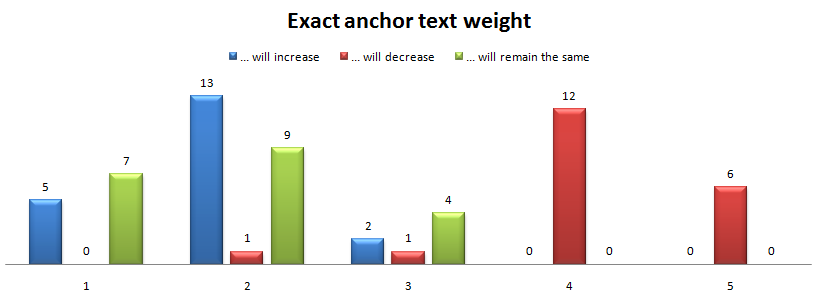
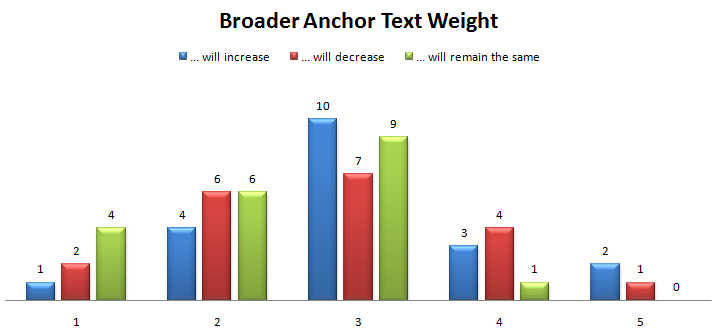
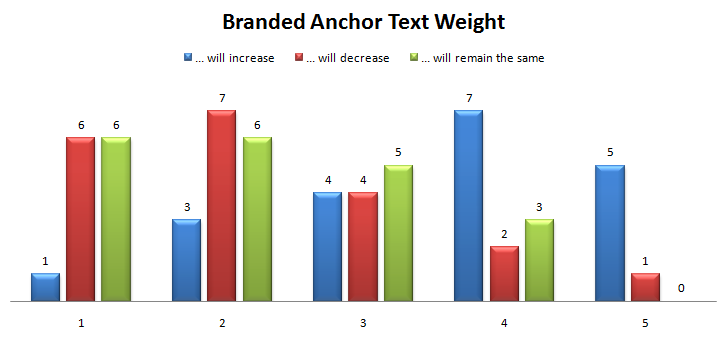
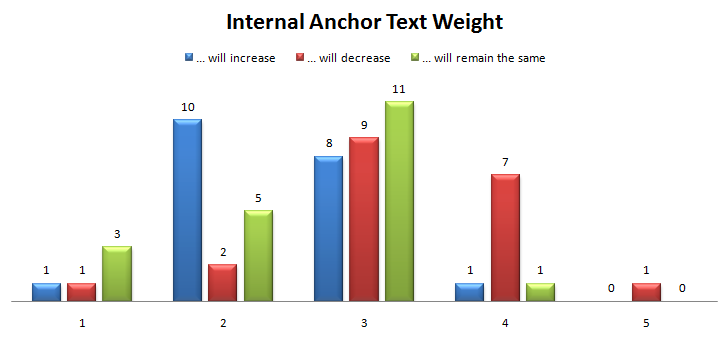
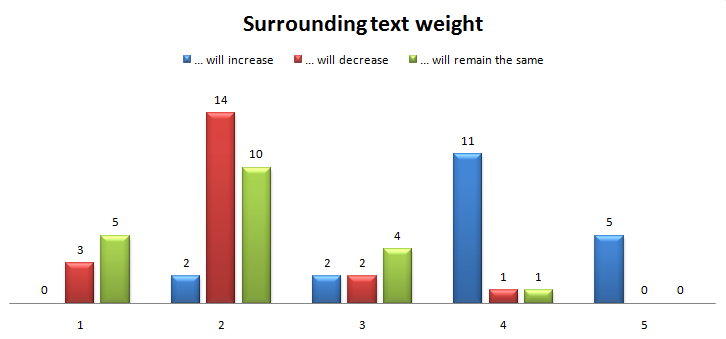
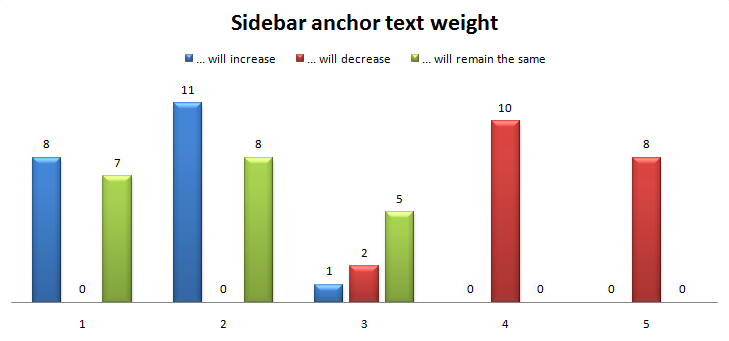
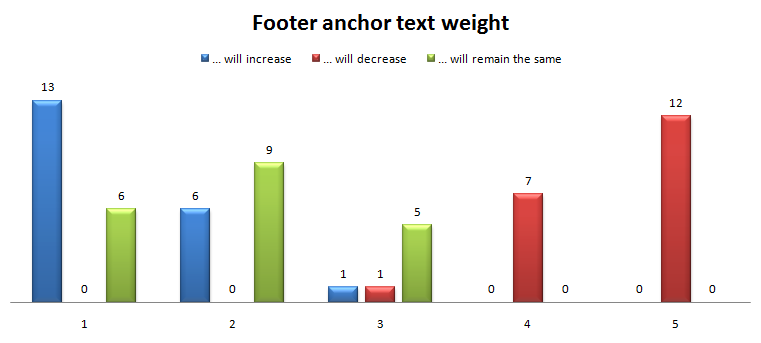
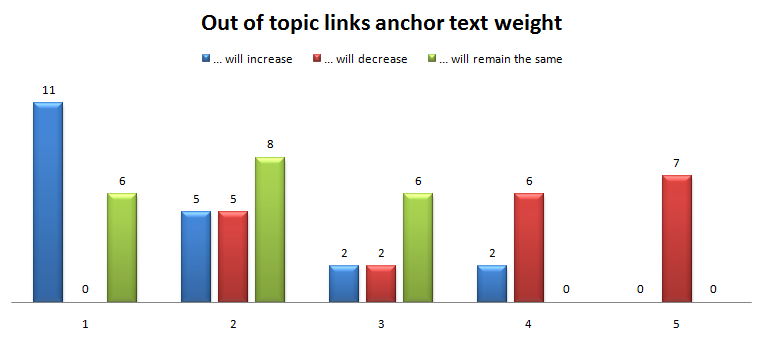
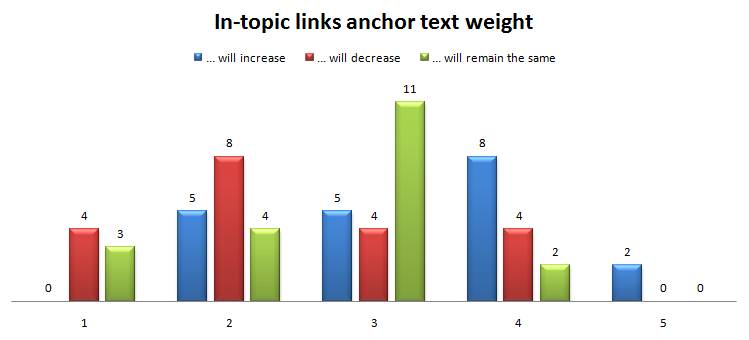
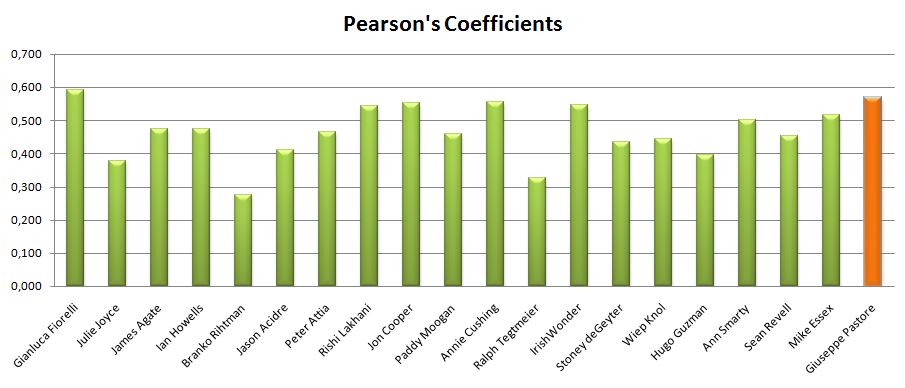
35 COMMENTS
[…] Anchor text in 2013+: how to link suggestions from 20 experts 1 Upvotes Discuss Flag Submitted 1 min ago Jason Acidre SEO en.posizionamentozen.com Comments […]
love it! – so much I Wordled it:
http://www.wordle.net/show/wrdl/5520507/Anchor_Text_Future
Then I shoved you all into a Twitter list
https://twitter.com/paulgailey/anchors
And whacked you all in a Circle: http://mmkt.in/OrOap9
Wow, Paul, I’m honored you’ve appreciated this post so much. We all have to thank participants who accepted to share their interesting opinions. I haven’t made so much.
Dude, thanks very much for allowing me to spout rubbish alongside some cool people 🙂
Thank you for having added that “rubbish”, Sean, I’ve found it very interesting! 😉
Hey Giuseppe!
It’s awesome that my post has inspired you to write this huge post on anchor text. I’d prefer if you could link my blog or my homepage over at onreact.com instead of my Twitter profile. I think Twitter does not need additional link love.
Hi Tad,
thank you for your post, and for lefting a comment here, I hope you’ve found something interesting in the answers.
Link changed 😉
It is critical we all take responsibility to link to people’s site instead of being lazy and link to Twitter profiles.
More and more, if you speak at a conference, you only get more Twitter followers, as live bloggers tend to link to your Twitter profile these days. Please, make at an effort to link to people’s websites, and Twitter profiles!
Good for you Tad you got the link changed
it is very powerful analysis , if decreasing of anchor text weight in the future , what will be happen future for the ranking ?
Great collection of solid SEO mind. Nice not just seeing all the celebrities on the list.
I feel that anchor text will always play a role in link building. Now a days you just have to be damn careful how you use it. After all we are trying to influence the results by mimicking something naturally and Google is just getting better at identifying who is on steroids.
You can use steroid aggressively till you are caught and thrown out.
You can use steroid tastefully masked by some other drug. You may be caught and you might not be.
You can forgo using steroids and workout harder. You might get there and you might not.
Its all a matter of choice .. pick your poison and roll with it.
Hi, thanks for the comment.
My opinion is anchor text will be an important factor still for some time but I tend to agree with who says its importance is going to diminish per se. I think it will be less important how people link out, but who (authorRank + contextual relevance) links to whom (brand and social signals). But as many have said, always better a keyword anchor from a trusted source than a generic one.
Am I the only one who was too lazy to read those graphs and try to interpret anything in that article?
*clicks close*
Great post Giuseppe, a lot of detail has gone into this article. It is fantastic to have some many opinions on this very topical subject.
Hi Jo,
thanks for having left a comment. I’m glad you liked it. I think being specific is a good idea, I hope to run some other of this interviews in the next months..
Although it was an entertaining read, and good questions to see the opinions of the participating experts on, I couldn’t help myself missing one thing in the questions: How do the different factors work together to make a site rank?
You cannot look in isolation on what the effects are from external link anchor text, and internal link anchor text. The effects of these are different for different sites. A site like eBay, with a massive backlink profile, has so much more power in Internal link anchor text optimization than a small SMB site.
This is often an overlooked field, where the area of SEO you work in determines to a great extend your answers to such questions.
Hi Dennis, thank you for the comment.
I think today quite every ranking factor has to be considered in correlation with some others and looking in isolation isn’t impossible, but you can’t have comparable answers being combinations of factors almost infinite.
Anyway I think size of site matters only in part when it comes to anchor text.
In a very simplicistic way of thinking, according to me, it changes a weighting factor that’s the internal amount of PageRank passed through the link, so anchor text value is amplified but it doesn’t change itself (of course I could be wrong on this).
However I hope that open-ended question have been an enough interesting free space for ideas and considerations (I think some useful concepts have emerged).
Awesome Post man, but in my opinion anchor text are still doing work for many businesses and some of them are outrank business who are doing less linking over the anchor text so its mean anhcor text are still meaningful but GODs know when Google next animal will eat them, but for now it is still working.
[…] rol van anchor text is op het moment een hot topic. De vraag is welke rol de anchor text in de (nabije) toekomst gaat spelen. In hoeverre zal deze factor mee gaan/blijven wegen in de rankings? Voor alsnog kent niemand de […]
Personally feel should use the anchor text that is appropriate for the site links are coming from.
For example, Directory – site and / or brand name, blog comment – persons name, bookmark – browser page title text, etc. Should then lessen the concern of the ever changing ranking algorithm updates!
This is a great post – in general it’s great for marketers (and everyone!) to think proactively instead of re-actively!
[…] Anchor text future according to 19 experts […]
[…] In this post Penguin Update world, links, and especially the anchor text, have become a topic hotter than ever. In the last two months, more … […]
[…] de las últimas encuestas realizadas (Anchor text future according to 19 experts, también en Slideshare) esta semana a un grupo de expertos sobre el futuro y evolución del […]
[…] A very interesting survey of people in the search industry took place recently by Giuseppe Pastore, on their opinions about how the search engines treat anchor text these days. The post is Anchor text future according to 19 experts […]
Great Post Giuseppe, But all in all talking anchor is talking hypothetical and I think Bill Slawski’s comments really are right on. Being in several different spaces at all times I find some industries rank well for exact match and some don’t depending on competitiveness of space. Size of Site does not appear to impact that as much as some might feel. Overall keyword reach is is dictated by size of site, not individual keyword rank. I would like to think that in a space that is very well defined having exact match is a very specific need your site won’t be penalized. Thanks again, it is great to have so many add their thoughts to such important issues. Maybe you should have Queried Matt on this. I am sure he could have supplied some very helpful insites.
[…] Giuseppe Pastore posts a round table discussion about the importance of anchor text in a post Penguin world: Anchor text future according to 19 experts. […]
[…] Anchor text future according to 19 experts by Giuseppe Pastore […]
[…] is crucial, don’t build too many money term anchors, a big Penguin no no (Giuseppe Pastore’s anchor text survey is well worth a read). Mix your anchors (brand only, brand with money, click here, www. and non […]
[…] Anchor Text Future According to 19 Experts – (Giuseppe Pastore, July 2012) […]
I believe anchor will always be a factor. May be not as strong as as it used to but nevertheless an important one. As no one knows what algorithmic changes the future will bring, I would recommend to anyone trying to rank for a specific keyword, do it for inner pages. If changes happen you can always delete an inner page. To the home page build links that have only a combination of a company name, brand name, owner of the company name, and the site url. No desired for ranking keywords at all in the anchor for the home page.
When I learned SEO and linkbuilding, I was tought not to use “click here” as anchortext. Right now I use anchors like that on purpose, to make my backlinks appear more natural!
[…] industry experts believe that anchor text will remain a ranking factor forever, no matter what changes come with the next Google […]
[…] Branchenexperten denken, dass der Ankertext Ankertext für immer ein Ranking-Faktor bleibe wird, egal welche Veränderungen das nächste Google-Update mit sich […]
[…] to many experts, anchor text will remain as one the most important ranking factor regardless of the updates that Google will roll […]
[…] Branchenexperten denken, dass der Ankertext Ankertext für immer ein Ranking-Faktor bleibe wird, egal welche Veränderungen das nächste Google-Update mit sich […]